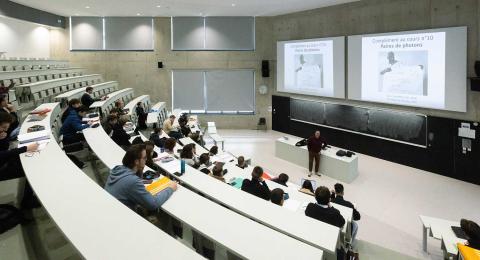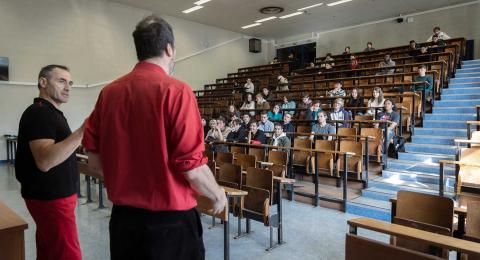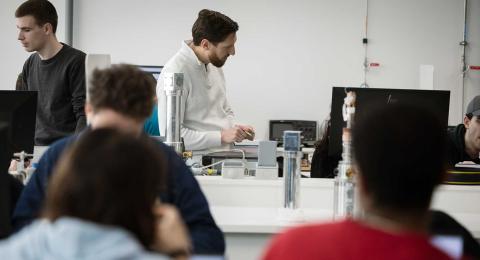The international Master 2 GenE2 provides training in cutting-edge technologies in genetics, genomics, and epigenomics. Combining theory with hands-on workshops (ChIP-seq, Big Data), it develops highly sought-after skills in high-throughput sequencing data analysis.
A distinctive feature of this program is its innovative approach, which integrates the latest techniques (single-cell omics, spatial transcriptomics, ChIP-seq) with advanced training in data analysis.
The Master 2 GenE2 is a program entirely taught in English.
It is a research-based training program that combines scientific lectures, research projects, hands-on workshops and an internship.
Students develop autonomy through individual or group work under the supervision of specialists.
The program is structured around three skill blocks:
-
Theoretical block (15 ECTS): organized as scientific lectures.
- 4 mandatory courses:
- Functional Genomics
- ncRNA and Epigenetics
- Genome Stability and Evolution
- Genomes, Phenotypes and Populations
- 1 optional course (choose one):
- Single-cell omics and spatial transcriptomics
- Metagenomics
- Scientific Project
- 4 mandatory courses:
-
Experimental block (15 ECTS): two innovative practical workshops:
- ChIP-seq
- Big Data
- Research immersion block (30 ECTS): a six-month laboratory internship in France or abroad.
Website: http://www.gene2.fr/
Information
Skills
1. Scientific and Technical Skills
- Mastery of fundamental concepts and methods in genetics, genomics, epigenetics, and evolution.
- Design, execution, and analysis of genomics and epigenomics experiments.
- Use and interpretation of high-throughput sequencing data.
- Mastery of modern sequencing techniques (ChIP-seq, single-cell omics, spatial transcriptomics…).
- Application of bioinformatics and biostatistics tools to analyze complex datasets.
- Creation, management, and visualization of large biological datasets.
2. Analytical and Methodological Skills
- Synthesis and integration of scientific knowledge and results.
- Development of a scientific critical mind, with the ability to identify the limits of an analysis.
- Design and planning of innovative scientific projects.
3. Professional and Organizational Skills
- Work independently and collaboratively in a research environment.
- Adherence to scientific rigor, protocols, and laboratory safety rules.
- Project management and organization in an international and multidisciplinary context.
4. Communication and Scientific Dissemination Skills
- Writing and oral presentation of scientific results.
- Ability to communicate results to diverse audiences, including for scientific publication.
Objectives
By following this program, students will be able to:
- Master the fundamental concepts and methods in genetics, genomics, epigenetics, and evolution.
- Define and carry out all steps of an experimental approach in genomics.
- Apply basic concepts of high-throughput data analysis.
- Design and analyze experiments using modern sequencing technologies.
- Identify, select, and apply existing tools in bioinformatics and biostatistics to analyze high-throughput sequencing data.
- Acquire skills in creating, managing, manipulating, and visualizing complex data.
- Apply knowledge to biomedical, applied, or fundamental research problems.
- Synthesize and integrate knowledge and results to present them in writing and orally, developing a scientific critical mind to understand the limits of high-throughput genomic analyses.
- Develop the ability to design and plan innovative scientific projects.
- Master laboratory practices: teamwork, scientific rigor, autonomy, communication, and laboratory safety.
- Develop the ability to work in an international and multidisciplinary environment.
- Strengthen skills in scientific publishing and communication to diverse audiences.
Career Opportunities
Career prospects
Après un Master ou Master + Doctorat : ingénieur (R&D, contrôle, production…)
Après un Master ou Master + Doctorat : chercheur ou enseignant-chercheur
Après un Master ou Master + Doctorat : ingénieur (recherche-développement, contrôle, production…) dans les domaines santé, pharmacie, agroalimentaire, biotechnologies, instruments et réactifs, cosmétique, dépollution et environnement
Secteurs d'activité : recherche fondamentale ou appliquée en Biologie, Santé ou Écologie dans le monde académique ou dans le secteur privé
Domaines : santé, pharmacie, agroalimentaire, biotechnologies, instruments et réactifs, cosmétique, dépollution et environnement
Après Master + Doctorat : chercheur ou enseignant-chercheur
Après un Master ou Master + Doctorat : ingénieur (recherche et développement, contrôle, production…)
Chargé de mission environnement / biodiversité
Expert science des données
Ingénieur Bioinformaticien (Recherche et Développement)
Après un Master : Data scientist
Après un master : Chargé(e) d’études
Ingenieur R&D
Responsable assurance qualité
Responsable de projets R&D
Chef de projet
Consultant
Ingénieur d’études dans les domaines de la recherche
Ingénieur d'études industrie / recherche publique
Enseignants-chercheurs
Ingénieur.e d’études
Ingénieur.e recherche & développement
Chargé.e de recherche et innovation
Chargé·e de projet
Chef·fe de projet en biotechnologies, biothérapies ou innovation en santé
Enseignant.es dans le secondaire
Métiers de la médiation culturelle
Responsable de laboratoire
Ingénieur de recherche ou d'études
Further Study Opportunities
Biologie-AgroSciences
Biodiversité, écologie et évolution
Master Bioinformatique
Master Biologie-AgroSciences
Master Biologie moléculaire et cellulaire
Master Microbiologie
Master Métiers de l'Éducation et de l’Enseignement
Doctorat en écologie / évolution / fonctionnement des écosystèmes
PhD en écologie, évolution
Doctorat en Chimie / Biologie
Doctorat en Bioinformatique
Doctorat
École d’ingénieur
Thèse de doctorat
Les diplômés peuvent être recrutés par voie de contrat de travail, de droit privé ou de droit public, mais peuvent aussi s'orienter vers les concours des fonctions publiques et des concours ou examens professionnels
Les étudiants de cette mention peuvent se tourner vers la recherche à l’issue du M2
Masters spécialisés (MBA en management de projet, en commerce, gestion de l’innovation dans les bio-industries)
Master Métiers de l'enseignement
Ingénierie études, recherche et développement
Ingénierie en agriculture et environnement naturel
Master BioMedical Engineering
Master Management de l’innovation
former des spécialistes de niveau international, produisant des travaux compétitifs au sein d’équipes reconnues des établissements publics à caractères scientifique et technologique (EPST), INSERM et CNRS en particulier
Ecole d’ingénieur généraliste
Ecole d’ingénieur généraliste par apprentissage
domaines de l’apprentissage statistique, de l’intelligence artificielle ou de l’analyse de données avancée
la formation permet également aux étudiants d’intégrer directement le monde de l’entreprise à l’issue du diplôme, dans des postes tels que Data Scientist, Data Analyst ou Ingénieur Machine Learning
Data Scientist, Data Analyst, Ingénieur·e en Machine Learning dans des secteurs innovants (tech, finance, santé, énergie, etc.) ;
Chercheur/chercheuse en R&D ou expert·e en modélisation et analyse de données dans des entreprises ou laboratoires de pointe.
Fees and scholarships
The amounts may vary depending on the programme and your personal circumstances.
Capacity
Available Places
Target Audience and Entry Requirements
- Students in Biology (Master degree or 4-year BSc), Medicine, Pharmacy, Veterinary Sciences, Biotechnology or Agri-food, or any other relevant scientific background.
- Professionals who wish to acquire skills in the manipulation, processing, and statistical analysis of high-throughput sequencing data.
- Researchers, engineers, or technicians in biology, biotechnology, genomics, epigenomics, or biomedical research laboratories, wishing to specialize in sequencing data processing and analysis.
- Hospital staff or clinicians in continuing education interested in medical genomics and patient data analysis for translational or clinical research.
Application Period(s)
From 09/02/2026 to 04/05/2026
Supporting documents
Compulsory supporting documents
Copy diplomas.
Copy of passport.
Motivation letter.
All transcripts of the years / semesters validated since the high school diploma at the date of application.
Curriculum Vitae.
Document indicating the list of local M2 choices available here : https://urlz.fr/i3Lo.
Additional supporting documents
VAP file (obligatory for all persons requesting a valuation of the assets to enter the diploma).
Supporting documents :
- Residence permit stating the country of residence of the first country
- Or receipt of request stating the country of first asylum
- Or document from the UNHCR granting refugee status
- Or receipt of refugee status request delivered in France
- Or residence permit stating the refugee status delivered in France
- Or document stating subsidiary protection in France or abroad
- Or document stating temporary protection in France or abroad.










